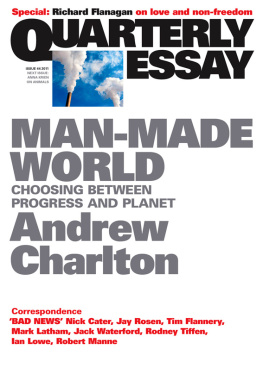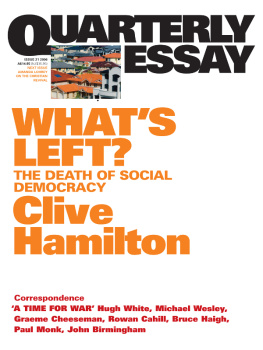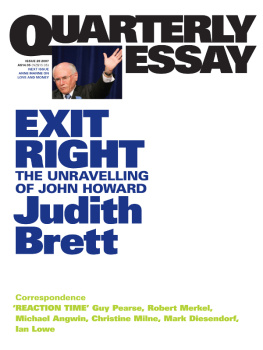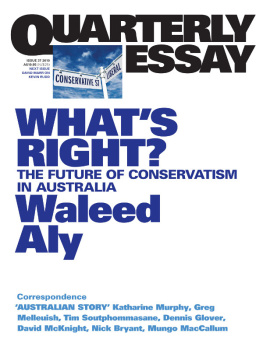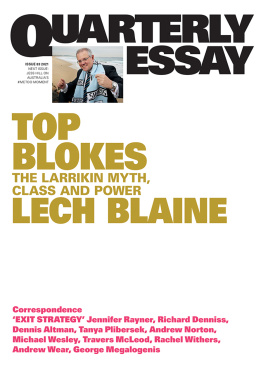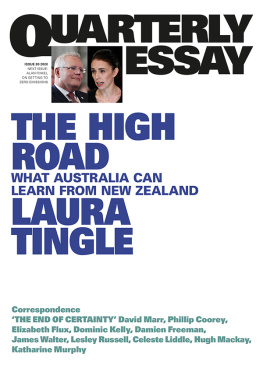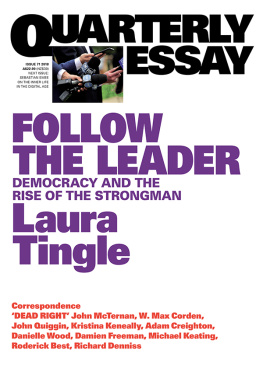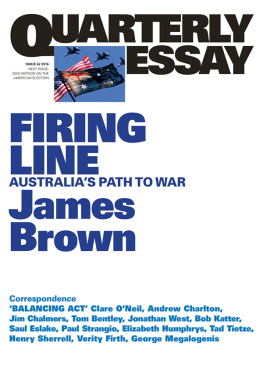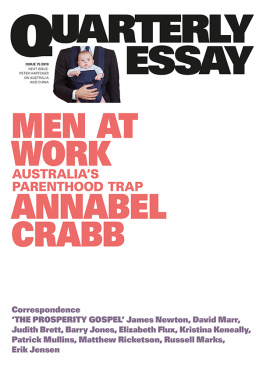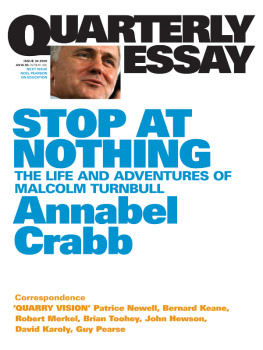Man-Made World: Choosing Between Progress and Planet
Andrew Charlton
What We Learned in Copenhagen
At 10.45 p.m. my phone rang. The Danes are switching to the back-up plan, a voice said. Room 20. 11.30 tonight. I pulled on my suit jacket, took up my warm coat and ventured downstairs into the night. I followed the now familiar route through Copenhagens cobbled laneways and grand boulevards, across the bascule bridge straddling its narrow harbour straits, arriving finally at the United Nations conference venue on Amager Island. The meeting place was a small, windowless room on the second floor. I took one of the seats behind a folded paper sign with AUSTRALIA printed on both sides.
The final hours of the Copenhagen Climate Conference unfolded in that room. By midnight two dozen presidents and prime ministers from the worlds most powerful nations had assembled with their advisers. Of course, this was not what the leaders had expected when they flew into the Danish capital for the second-last day of the two-week conference. They were scheduled to attend a state dinner at Christiansborg Palace, deliver a prepared speech on the conference floor and shake hands on a climate deal already hammered out by their negotiators. But as their jets touched down on the icy runway, weary officials greeted them with the news: there was no deal. Lengthy negotiating sessions had dissolved into protests, bickering and brinkmanship. Global leaders had flown into a failing summit and a looming political disaster.
The Danish hosts had convened the midnight meeting as a desperate last-ditch measure. Convinced that the formal negotiating process was hopeless, the Danes gambled that a small group of key leaders might be able to break the stalemate. Cramped and airless, the room lacked the opulence and technical wizardry typical of global summits. There was no lavishly adorned conference table for the leaders. No concentric circles of advisers, attendants and security. No simultaneous translators mouthing like goldfish inside soundproof glass booths. Instead, leaders hunched in plastic chairs around a rectangle of contiguous small tables. The scene looked more like a crowded primary-school classroom than a global summit freighted with the hopes of the world.
Barack Obama flew into Copenhagen later than the other leaders. When he reached the meeting at around 9 a.m., his presence injected a much-needed optimism into the room. The faces of frustrated leaders and their wilting advisers instantly brightened, as if salvation had just opened the door. Obamas personal staff sometimes jest that they work for Black Jesus. Suddenly I got the joke. Everywhere he goes, people expect a miracle. But a miracle was not looking likely. As Obama took his seat, his Secretary of State, Hillary Clinton, summarised the state of play. Mr President, Clinton said, this is the worst meeting Ive been to since the eighth-grade student council.
For the next twenty hours the room whirred with debate and dispute. Negotiations continued through the day, sometimes in the room, sometimes spilling out into the corridor, and at one point in the Chinese premiers hotel on the other side of town. Rich countries offered more financial support and greater flexibility for poor countries. Momentum surged forward and fell back. A deal seemed won and then lost. Finally, long after we had begun, the meeting dissolved in substantial disagreement. There had been no miracle. A short face-saving statement was all that was salvaged from the wreckage.
Thwarted and exhausted, leaders dispersed to face the bright glare and fading expectations of waiting news conferences. Ashen-faced under the lights of the television cameras, they delivered the bad news. Obama looked down the barrel of the camera and conceded that it was not enough. Kevin Rudd who with Penny Wong and her staff in the Department of Climate Change had worked as hard as anyone to get a deal admitted he was disappointed.
Elsewhere the disconsolate began pointing fingers. Green activists flung insults at departing delegates. The city of Copenhagen is a crime scene tonight, Greenpeace seethed, with guilty men and women fleeing to the airport. In the press centre, journalists sharpened their knives for a bloodletting across the worlds front pages. A British editor inked the next days headline: A historic failure that will live in infamy. Sydneys Daily Telegraph prepared to splash with a bitter pun: COP OUT.
When, after the failure of negotiations, we left the convention centre at 4 a.m., Id been awake for forty-five hours. Many of the Australian team had been awake for longer, an exhausting sprint at the end of a marathon year of preparation. Through the haze of fatigue and crushed expectations there was one outstanding question: how could this have happened? Billed as the summit to save the world, the Copenhagen Climate Conference had attracted unprecedented global attention. Decades of scientific work had built the case for action. More than a hundred heads of state, thousands of negotiators and countless NGOs had converged. How, with the best of intentions, with the world watching, could something so important go so wrong?
There was no shortage of answers, but few of them were satisfying. Many Western commentators immediately accused their political leaders of venality and sabotage; one British journalist reported that a deal was systematically vetoed by the governments of North America and Europe. The environmental campaigner George Monbiot blamed American oil companies: This [failure] is the result of a systematic campaign of sabotage by certain states, driven and promoted by the energy industries. Much of this didnt ring true to me because, as far as I could tell, Western leaders were pushing hardest to get a deal. At one point, an obviously frustrated Angela Merkel had demanded, Why cant we even mention our own targets? when poor countries rejected her attempt to record strong commitments that would have applied only to rich countries. Every Western leader in that room was seeking to strengthen the deal, not weaken it.
Others blamed China. Ed Miliband, then Britains climate secretary, claimed that tougher emissions reductions were vetoed by China, despite the support of a coalition of developed and the vast majority of developing countries. Again this doesnt feel like the full story. No single country was powerful enough to veto the deal without support from a wider constituency. Even the United Nations came in for criticism for its organisation of the official meetings. It is true that the UNs ham-fisted attempts at democracy had delivered anarchy on the conference floor, but the disorder and procedural bickering wasnt the root cause of the deadlock; the chaos was merely a symptom of a deeper discord.
The fundamental problem was not the United States, Europe, China or even the United Nations. Accusations of cowardice, stupidity, mendacity or any other simplistic tabloid insult missed the point. The deal broke down because Copenhagen exposed the central dilemma of our century: the choice between progress and planet.
Our planet is home to 7 billion people. Of these, roughly 1 billion live in rich countries: North America, Europe, Japan and Australia. The leaders of these countries arrived in Copenhagen persuaded of the urgency of the environmental challenges facing our planet. Backed by thousands of journalists and green activists, they pushed for a strong global agreement.

